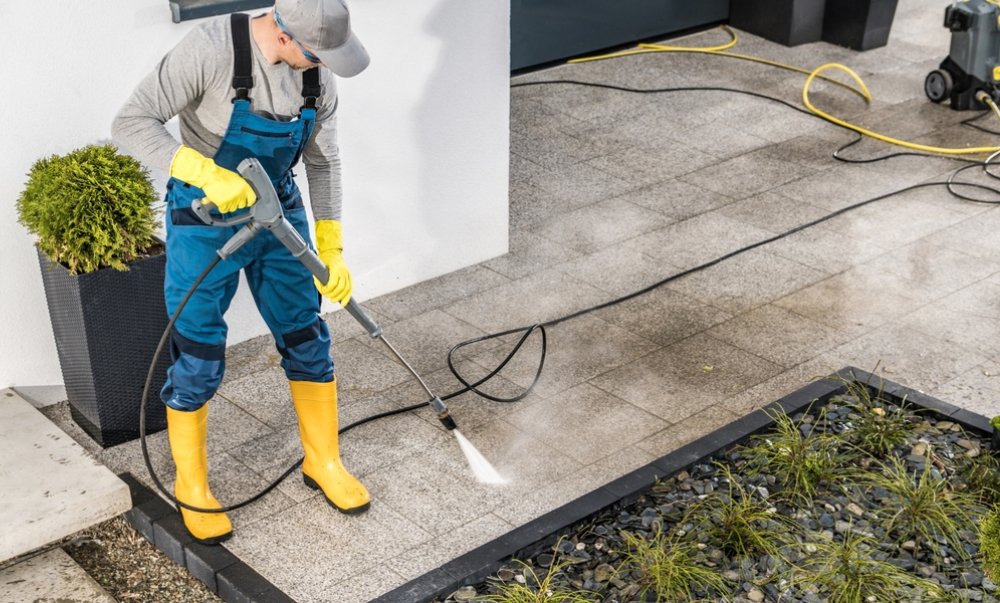
Pressure Cleaning: How It Works and Why It’s Crucial
In the field of outdoor maintenance, few tools wield as much transformative power as pressure cleaning. From driveways to decks, this versatile technique can breathe new life into even the most weather-worn surfaces. However, its benefits extend far beyond mere aesthetics. In this comprehensive guide, we’ll delve into the science behind pressure cleaning, exploring how it works and why it’s crucial for the longevity and health of your Florida pavers.
Understanding the Basics of Pressure Cleaning
Pressure cleaning, also known as power washing, utilizes a high-pressure stream of water to remove dirt, grime, mold, mildew, and other contaminants from surfaces. The process involves the use of specialized equipment by pressure cleaning experts. These tools include a pressure washer, which generates the force needed to dislodge stubborn buildup and restore surfaces to their original condition.
How It Works
At its core, pressure cleaning relies on the principles of physics to achieve its cleaning power. The pressure washer pumps water at high velocity through a narrow nozzle, creating a concentrated stream of water molecules. This high-pressure stream effectively agitates and dislodges dirt particles from the surface, while the sheer force of the water carries them away.
The Importance of Pressure Cleaning for Your Pavers
Now that we’ve covered the basics, let’s explore why pressure cleaning in Florida is indispensable for maintaining the health and beauty of your Florida pavers.
Removing Stubborn Stains and Buildup
Over time, pavers can accumulate a variety of stains, from oil and grease to algae and mildew. These unsightly blemishes not only detract from the appearance of your outdoor space but can also compromise the integrity of the pavers themselves. Cleaning by pressure cleaning experts provides a highly effective solution for removing stubborn stains and buildup, restoring your pavers to their pristine condition.
Preventing Weed Growth and Vegetation
One of the most common challenges faced by paver owners is weed growth and the proliferation of unwanted vegetation between the joints. Pressure cleaning not only removes existing weeds and plant matter but also disrupts their growth cycle by eliminating the conditions conducive to their proliferation. By keeping the joints clean and free of debris, pressure cleaning helps prevent weed growth and prolongs the lifespan of your pavers.
Preserving Structural Integrity
Beyond mere aesthetics, pressure cleaning plays a crucial role in preserving the structural integrity of your pavers. Dirt, grime, and organic matter can accumulate in the pores and crevices of the pavers, leading to moisture retention and potential damage over time. By thoroughly cleaning the surface and removing contaminants, pressure cleaning in Florida helps prevent moisture-related issues such as efflorescence, cracking, and shifting, ensuring the long-term durability of your pavers.
Enhancing Safety
In addition to preserving the health of your pavers, pressure cleaning also enhances safety by removing slippery substances such as algae and moss. These substances can pose a significant hazard, particularly in wet or humid conditions, increasing the risk of slips and falls. Pressure cleaning eliminates these hazards, creating a safer environment for you, your family, and your guests to enjoy.
The Science Behind the Clean
To understand the effectiveness of pressure cleaning, it’s essential to delve into the science of pressure cleaning. As the high-pressure stream of water makes contact with the surface of the pavers, it creates a series of physical and chemical interactions that facilitate the removal of dirt and contaminants.
Mechanical Action
The sheer force of the water stream exerts a mechanical action on the surface of the pavers, dislodging dirt particles and debris through sheer kinetic energy. This mechanical action is particularly effective at removing stubborn stains and buildup that may have adhered to the surface over time.
Hydrodynamic Shearing
As the water molecules collide with the surface of the pavers, they create a hydrodynamic shearing effect that helps break apart and disperse dirt particles. This phenomenon of the science of pressure cleaning is akin to the force exerted by a high-pressure hose, which can penetrate deep into the pores and crevices of the pavers, ensuring thorough cleaning.
Chemical Reaction
In addition to mechanical action, pressure cleaning in Florida can also facilitate chemical reactions that aid in the removal of contaminants. Many pressure cleaning solutions contain surfactants and detergents that help break down oils, greases, and organic matter, making them easier to rinse away. By harnessing the power of chemistry, pressure cleaning can achieve more effective results than mechanical cleaning alone.
Conclusion
In the world of outdoor maintenance, pressure cleaning stands out as a powerful and versatile tool for revitalizing and preserving outdoor surfaces. By harnessing the principles of physics and chemistry, pressure cleaning effectively removes dirt, stains, and contaminants, restoring your Florida pavers to their original beauty and ensuring their long-term health and durability. Whether you’re tackling a small patio or a sprawling driveway, pressure cleaning offers a cost-effective and environmentally friendly solution for keeping your outdoor space looking its best.
FAQs
How often should I pressure clean my pavers?
The frequency of pressure cleaning depends on factors such as weather conditions, usage, and the buildup of dirt and stains. As a general guideline, aim to pressure clean your pavers at least once or twice a year to maintain their cleanliness and longevity.
Can pressure cleaning damage my pavers?
When performed correctly by using the appropriate pressure and techniques, pressure cleaning should not damage your pavers. However, excessive pressure or improper handling can potentially cause damage, such as etching or dislodging of pavers. It’s essential to follow manufacturer recommendations and seek professional advice if unsure.
Is pressure cleaning environmentally friendly?
Pressure cleaning is generally considered environmentally friendly compared to chemical-based cleaning methods, as it primarily uses water and mechanical action to remove dirt and stains. However, runoff containing contaminants washed off during cleaning can potentially impact the environment, so it’s advisable to use eco-friendly cleaning solutions and dispose of wastewater responsibly.
